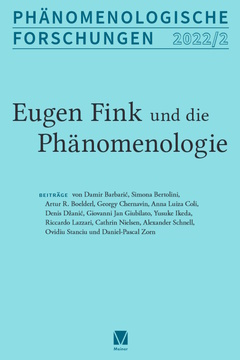Repository | Journal | Volume | Articles

(2022) Phänomenologische Forschungen – Neue Folge 2022 (2).
Breaking the hermeneutic circle
phenomenology as "catastrophe of man" in Fink's early thought
Giovanni Jan Giubilato
pp. 37-56
Fink’s early thought is characterized by a sort of fragmentation and concealment, since it must be reconstructed by bringing together the few texts that he wrote during his collaboration with Husserl – and mainly for him – with the great number of private notes and drafts that accompanied, quasi subterraneous, his assistant activity. Based on these materials, the present papers intend to bring to light the coherent theoretical framework which underlies Fink’s conception of philosophy as meontic phenomenology and especially as catastrophic thinking (katastrophales Denken). Based on a clarification of the concepts of “world” and “absolute”, Fink’s thought will be investigated in the light of the double movement of )kbasis and kat'basis that he established between the two realms of what is constituted and what is constituting. It will lead, through a radicalization of the reduction as dehumanizing and absolution, to a new phenomenological understanding of philosophy as “katastroph)”, which is based on a definitive breaking of the hermeneutic circle.
Publication details
Full citation:
Giubilato, G.J. (2022). Breaking the hermeneutic circle: phenomenology as "catastrophe of man" in Fink's early thought. Phänomenologische Forschungen – Neue Folge 2022 (2), pp. 37-56.
This document is unfortunately not available for download at the moment.


